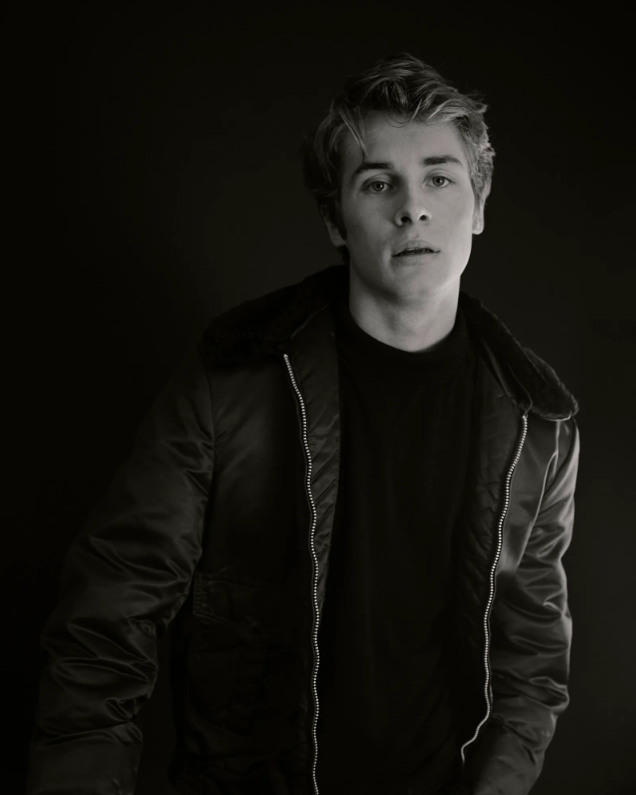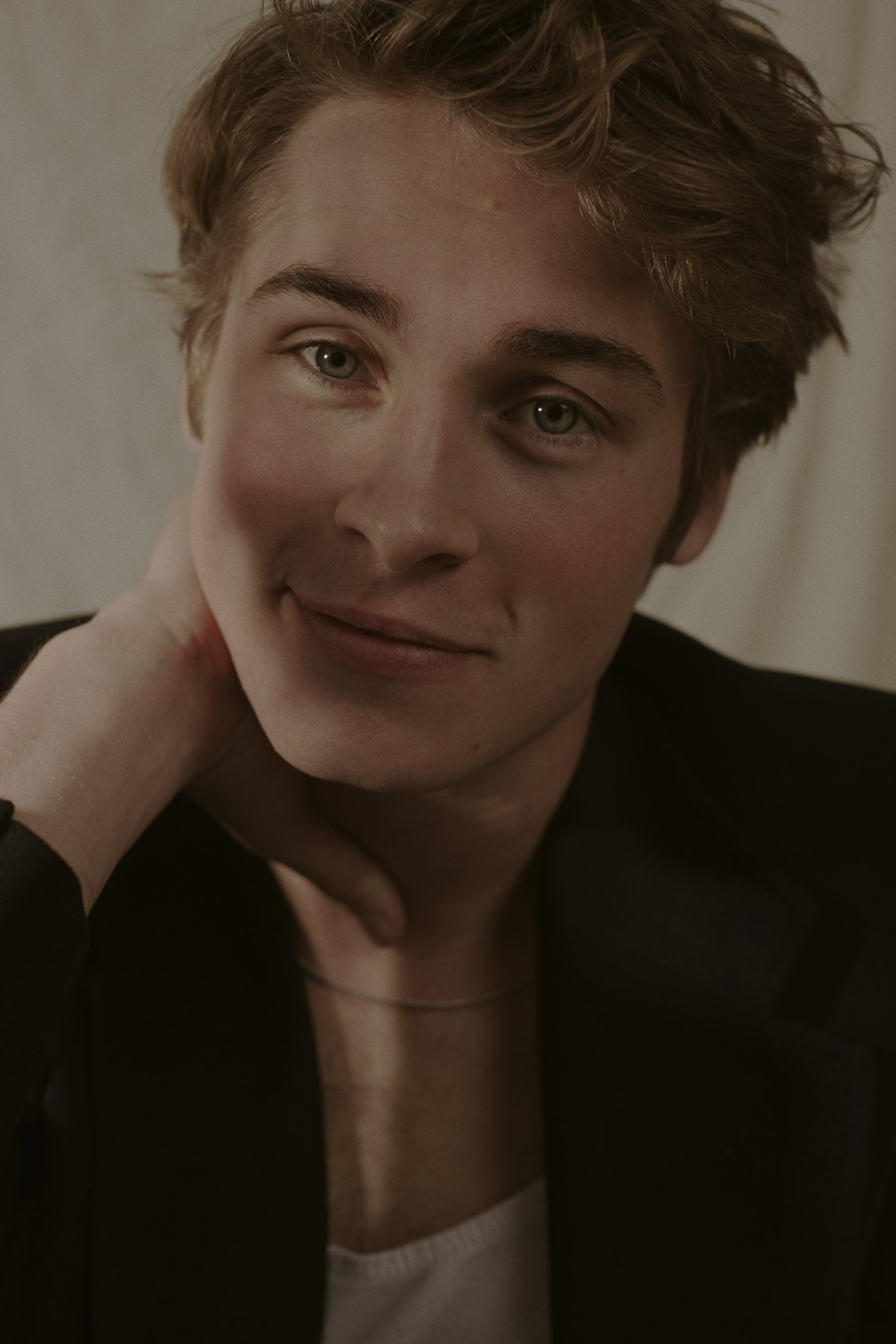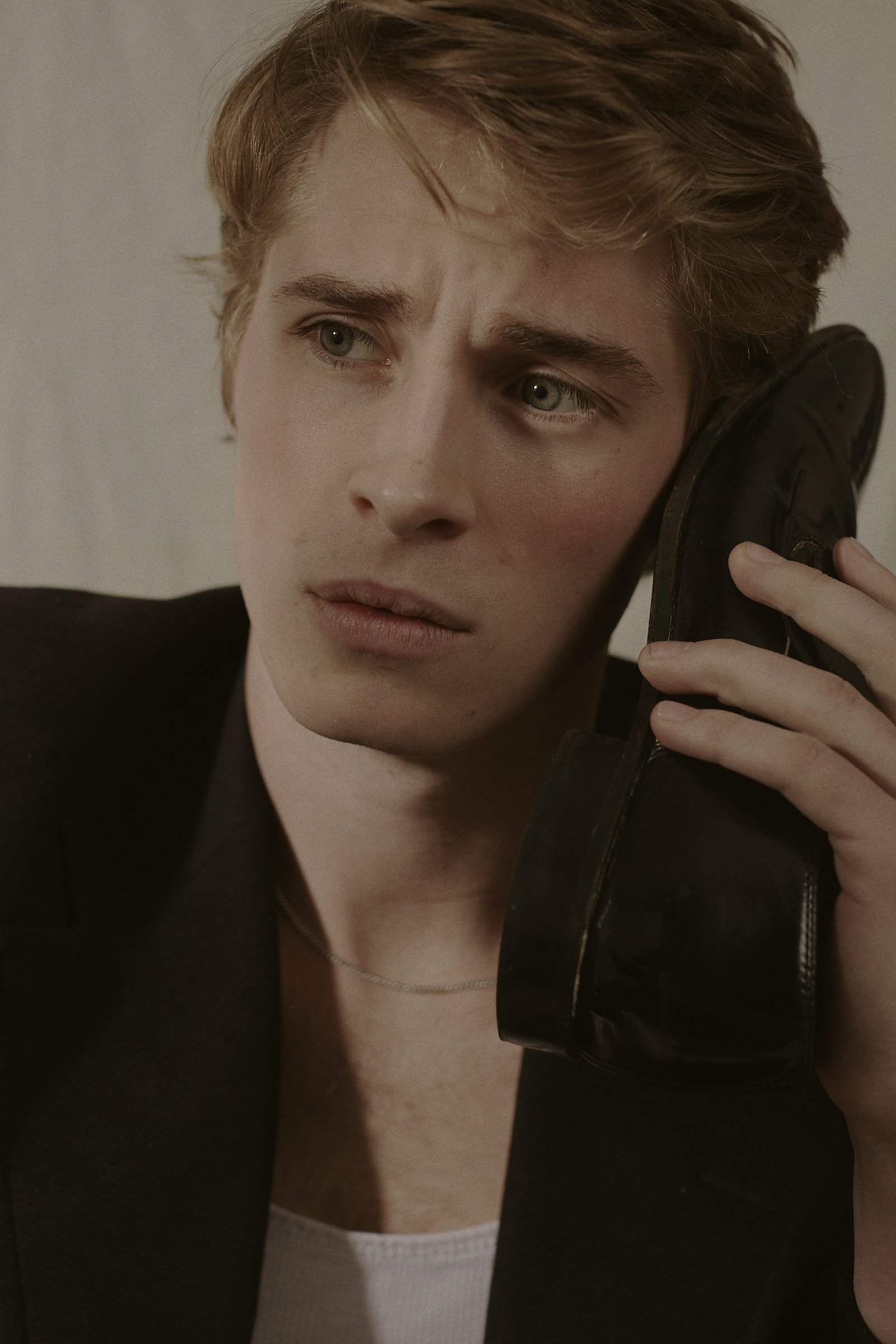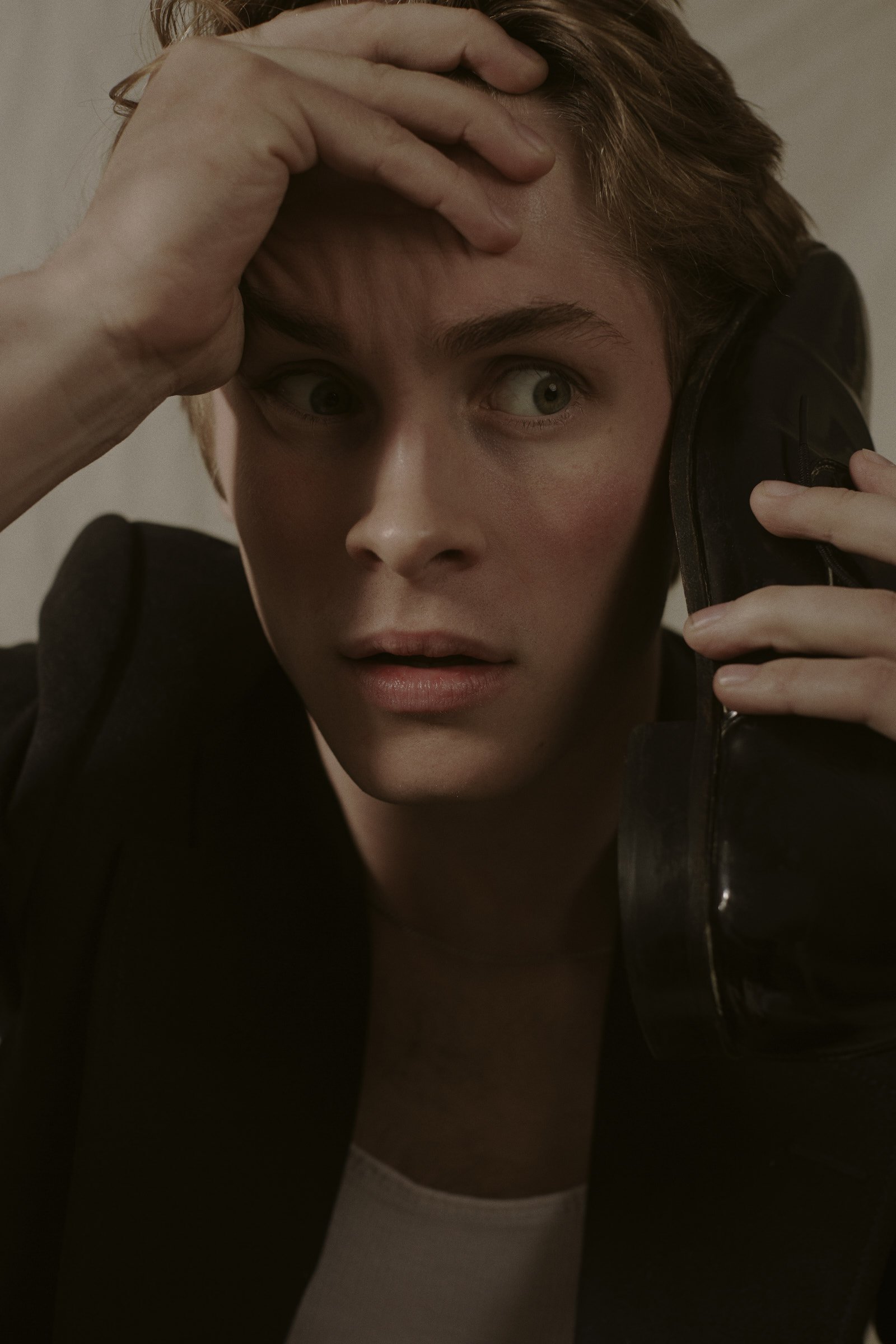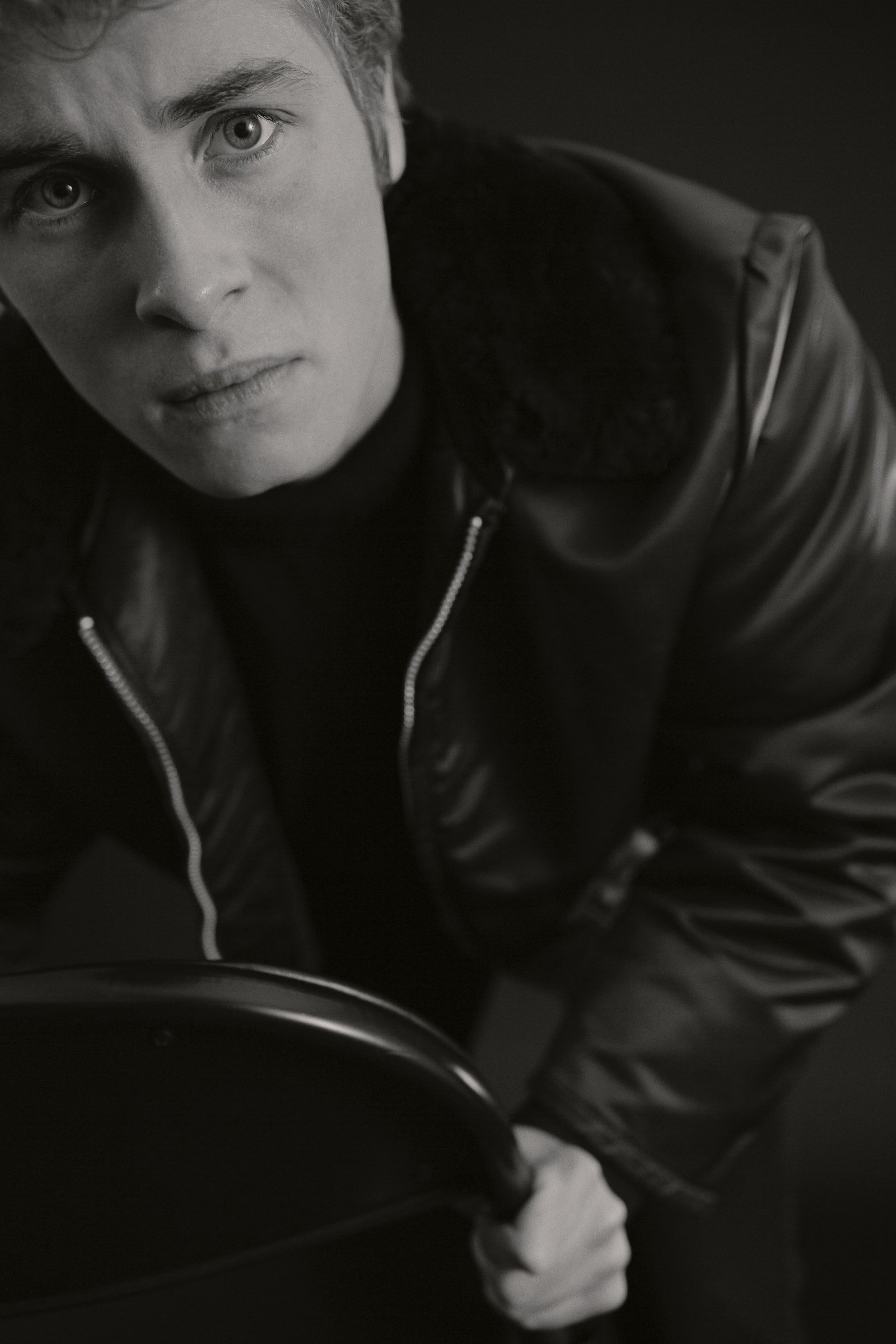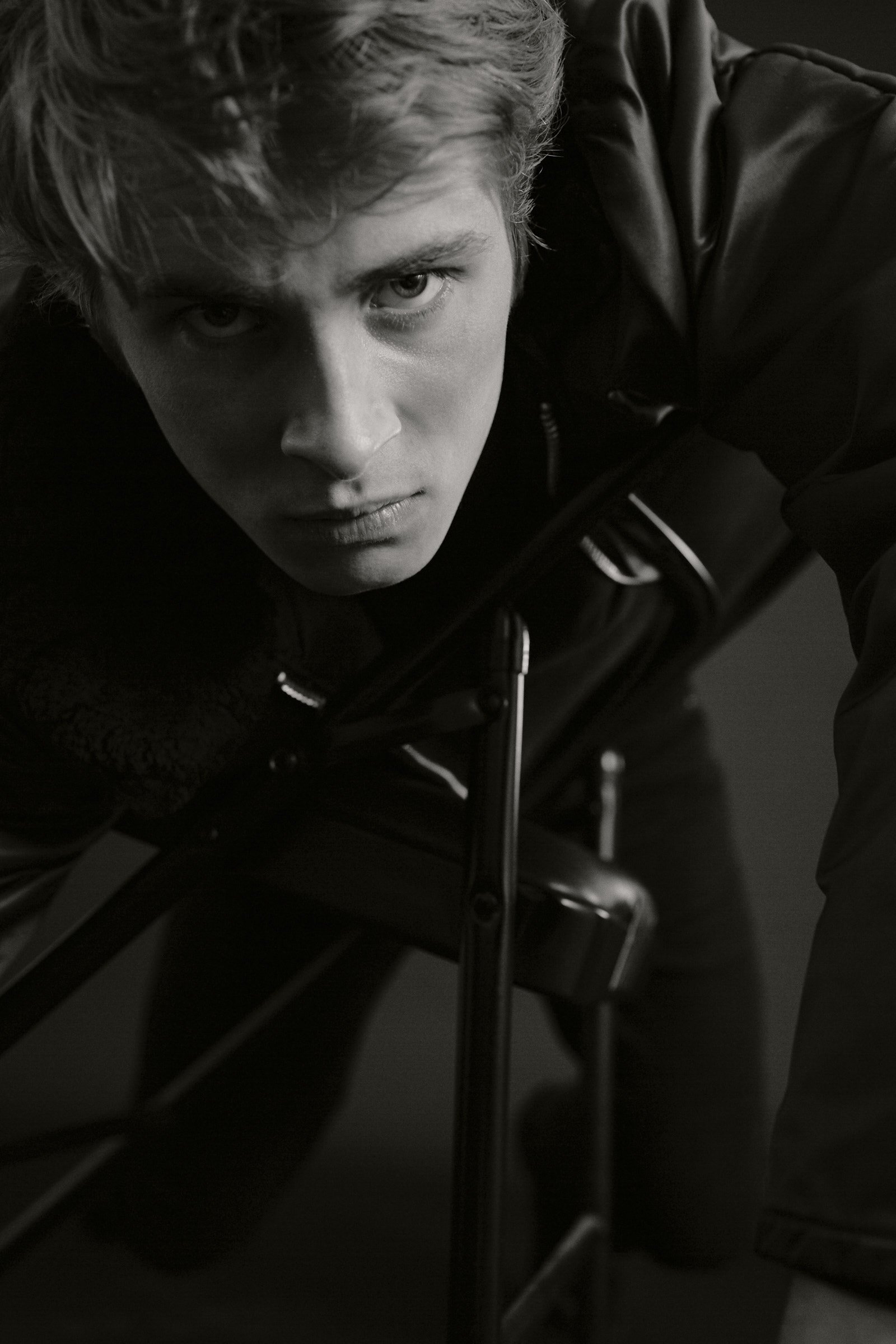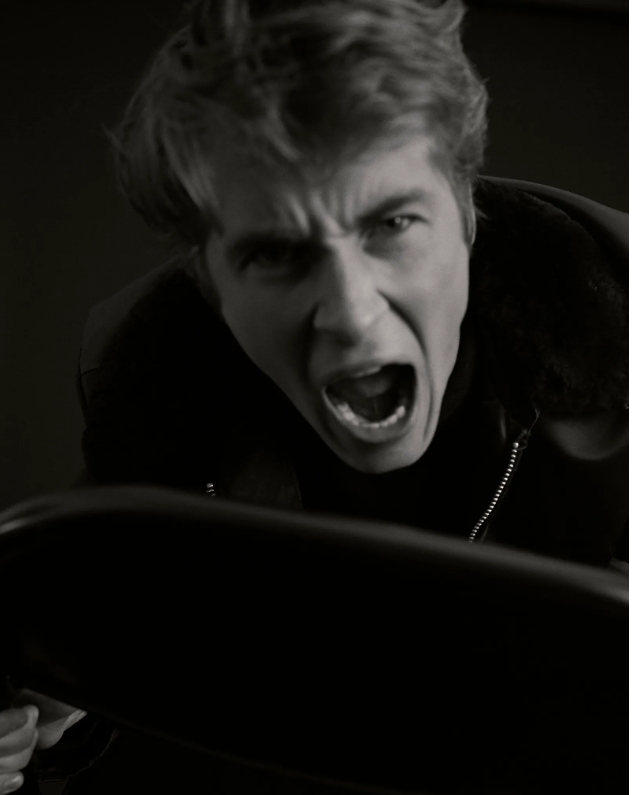Michael Provost
In Reflection: A Conversation with Michael Provost
〰️
CARIANN: So I want to talk about you.
MICHAEL PROVOST: You want to talk about little ole me?
C: [Laughs] Yes, you. Exactly. Davy speaks very highly of you — how long have you guys known each other?
MP: We shot from 9am to 3pm. So that’s about six hours?
C: Oh! Oh my. From what he said I thought you were longtime friends. [Laughs] Before talking to you I asked Davy if anything came up in the shoot, if there was anything I should keep in mind while talking to you. He was saying that you’re one of the most multifaceted people.
MP: That’s a big word.
C: Apparently in such a short amount of time during the shoot, he saw so many sides of you.
MP: Oh, well that is true. That is very true. We covered the spectrum in terms of what he was able to shoot — it was actually shocking. To go back and look at some of the grabs that we got — I am blown away.
C: Davy is amazing. When I heard that from him I thought ‘oh, I don’t know if I expected that’ because all I’ve seen of your work is “Insatiable.” And that only seems like one side of you, you know?
MP: I would say…[Laughs] I would say it’s a very small part of me. I would agree with that, very much so. When I got that pilot, I had no idea what the show was going to be. As a young actor in LA, you jump at whatever you can get. I don’t want this to sound like the show was a negative experience — because it wasn't!
I don’t know if you saw, a "Deadline" article came out maybe three days ago — our season three is not happening.
C: Oh okay, I didn’t see that.
MP: We’ve known for maybe two or three months now. I’m through the process of mourning — we were all on the phone with each other when we found out. You spend that time in tears. I saw the show [as a whole] like someone inviting you into this museum, into a space where you can create and put up whatever you want — it’s a blank canvas. They brought us in — this specific cast, this crew — and they said ‘create! Go ahead. Put up whatever you want.’ As a young performer, allowing myself to find my feet and allowing myself to be a confident actor on set — it was the perfect place for me to do that. For me to fall and get back up. There were hard days where I came home from work, put my head in my hands, and just moaned and sighed in my apartment. Being like ‘oh my god. I have no idea what I’m doing. But I have to trust that I’ve been doing this for four years and I’ll figure it out.’ There is such a difference between acting in a classroom and acting on a set. The show ending, I saw as this: you’re in this space and someone taps you on the shoulder and they say, ‘so sorry, but we’re closing.’ You forget — you completely forget that that is part of museums, too. Like right, okay, at some point they have to shut down, and they politely ask you to leave.
You look at all the work you’ve put up and you can’t help but feel proud of it. And then it’s on to the next thing. You’re stepping into the next place to paint, to create.
It also feels like someone pulled a rug out from under you, and you land right on your ass. You think, ‘oh my god, I’m never going to work again.’ That’s what I thought. [Laughs] I went and got a day job at Midici’s Pizza.
[The show] was a beautiful experience. I would do it over again — a hundred times, yes.
But, we’re talking about being multifaceted, yes?
C: Yeah, I’m interested in knowing: what do you want to explore going forward? In your acting and in what you show people.
MP: [Silence] Hm. It’s about healing. It’s about telling stories that people can relate to, find themselves in, and feel from. It’s about offering a distraction for those who need it. Playing ‘hot, young highschooler’ is definitely something I’d like to get away from. But that is all I go out for right now. [Laughs] This is a fantastic question! A part of me is extremely eager to be involved with a period piece.
I would like my work to offer a distraction — an escape for those watching — for those watching to feel included in the story.
I would love for someone to look past my outward appearance and trust me with something that is a bruiser of a character — someone who is a bit more than a smile and a wink. I know what I have in me. I know what I’ve lived through. I know what makes me, me. And I’m not running from it anymore.
C: My best friend Kristen, she is the most into TV and movies person I have ever met in my life. And it’s one of the things that makes her who she is. She’s a big time fan — she is that person. I’ve always tried to get into her headspace when I talk to actors and actresses because she gets really attached to characters; she sees them in this really visceral way. When something is over, she almost mourns the loss of the show or movie ending. I’ve always thought it was interesting talking to her about acting work. Because she also gets really attached to the person. If she loves a character, she knows that person, she knows who the actor is. I think that’s what social media has given us — we can also get to know Michael, not just Brick. You know?
MP: That’s how I feel about books. Kristen and I have that in common. I’m an avid reader. As a dyslexic, getting through a book is kind of like a marathon for me. But I’m addicted to the process and the creation of that world in my imagination. Are you a Harry Potter fan?
C: I am. Not huge, but yes.
MP: Well I grew up with the Harry Potter “Scene It” and I am a bit of a mega-fan.
C: [Laughs]
MP: Having that world created after going through the process of my mother reading those books to me, etc. — it was shocking. Then it changed when later books came out — I was now seeing young Daniel Radcliffe and Emma Watson, as opposed to the imagined characters I had created in my head. Film does such a great job of allowing that escape — bringing you into it and creating that. So then for it to end — the episode, the movie, whatever you’re watching — and credits to roll, you realize ‘oh, that’s not Brick Armstrong, that’s Michael. That’s not Harry Potter, it’s Daniel Radcliffe.’ You are pulled back to this idea that all of it was pretend. It was all a play. It was all imaginative.
I love what I do. It’s spectacular. It’s the greatest show on earth.
Hm. Wow. I am still really mulling on that question.
C: [Laughs] Sorry, I didn’t mean to stump you.
MP: It’s the question that, crazy enough…no, actually, not crazy enough — it’s the exact question I need to be asking myself right now with the show just ending. I have a film coming up this March in New York, but after that, I should be the one with a plan of the work I want to see myself doing.
Cariann, my mother would tell me that God laughs at the man who makes plans. My father would tell me that the man who doesn’t make plans is lost. That is a consistent polarity in my life — I will either have too much of a plan and then the universe laughs at me and I have to change it. Or I have no plan at all and I find myself wishing I did.
C: I feel like as a young actor though, that’s what you have to do. You have to just take what comes to you in the wind, you know?
MP: Yes. There’s what you can control and what you definitely can’t. I can control showing up to every audition, being prepared, ready to drop into the character, ready to make a connection with the casting director and create a relationship. I can’t control the project that they decide to book me on. What I can control at this point is if I want to do the project, or if I don’t want to. Did Grace talk to you at all about…oh my god. Grace Fulton. Grace Fulton. Isn’t she an angel?
C: [Laughs] She is so amazing. I got a bit emotional during our interview actually. That doesn’t happen to me often.
MP: That’s her. She just flew to Chicago to attend the musical of a girl that was playing her younger sister in a film we just did. She is…she is a force of good nature. And such an old soul, very regal and victorian.
C: Yeah, I’ve seen that in the little bit I’ve gotten to experience of Grace — even her voice is so gentle and calming.
MP: She was a delight to work with! An absolute gem of a human. Wait, what were we talking about again, Cariann? I'm sorry.
C: [Laughs] I guess this can go off of the earlier question, but Davy was saying that some of your portraits are a bit darker — not literally, but emotionally.
MP: Oh yeah, for sure.
C: But silliness is so much of your personality and that’s what we see in “Insatiable” — even just hearing your voice today and hearing you joke around. You have such a light way of interacting. But then there is this other side that people haven’t seen yet. I wanted to ask about that. Because some of the portraits I’m including are of you screaming the Shakespearian monologue at Davy. [Laughs]
MP: [Laughs] Poor Davy. But yes. I’m one of five boys. I grew up in a house where I was constantly on guard. Rough-housing was a big part of my childhood. My two older brothers would come after me constantly. Which subsequently led to my aggression toward my younger brothers — something that, a time or two, has certainly gotten out of hand. Rage. You know, anger — as my mother would say — is the final frontier of emotion. To add to her words, I would say that rage is the step beyond that. You have blinded yourself. And rage became a defense mechanism for me. I played high school sports — it was football. And that game, as much as I love to watch it now, I look back and I was getting hit in the head repeatedly. For four years straight. After school, every day. I was a smaller kid; I didn’t play a whole lot, so practice became a time for me to just prove my worth. Which created a bit of…[Laughs] I’ll call it a Napoleon complex, why not? A short man trying to prove something in a big man’s game.
So I would say that is where anger and the darker side, as we’re calling it, was basically born. I didn’t just wake up one day and say, ‘oh. I’m an angry person.’ I’m not. I think the wisest men approach every moment of their life with joy. I feel like if I can get to that place of going through hell, but doing it with a smile on my face, that is where I want to be.
Sorry, some loud fuck is driving past…[in a British accent] have a good one!
Anyway, back to it. But yeah, that is where I want to be. Experiencing my lows with at least an essence of high. Just because — I don’t like that side of myself. When I get there…it scares me. It’s scared my family. I would say it’s something my brothers and I all share and have, and it’s definitely something I see in my father.
I know that is where acting has become therapy for me. Are you familiar with Shanley? He’s a playwright, and he writes these brutal characters. Especially for men — absolute neanderthals, cavemen. I would say that the stage is where I first figured out release in a healthy way, with someone else. Someone who is in the situation as much as me, understands the stakes are as real as it gets in that moment, in that little black box. Then to pull out of it and have that person hug me and smile at me and tell me that it’s okay — and be with me until I come out of that…when that occurred, I was like ‘how could I not explore this more?’
Because as men — I was told that emotion is something that I should save for myself. Something that I shouldn’t share with other humans. I remember when I first started acting, I was telling my mother, “I don’t have time for sadness.” I don’t get the point. I don’t understand why anyone would spend time being sad.
You know, someone later in life told me this lore about John Lennon — a teacher is handing out little slips of paper in his first grade class and you have to write what you want to be on it. Draw and write what you want to be when you grow up. John Lennon draws this big, yellow smiley face, hands it back to his teacher, and it says ‘when I grow up, I wanna be happy.’ And his teacher hands it back and says, ‘John you have to redo this, you don’t understand it.’ He looks at her and says, ‘I don’t think you understand life.’ I loved that. Why would I spend my time being anything but happy?
And my mother was just so confused by that when I told her I wanted to be an actor. She said, “Michael, you need your emotion." That is a lifeline for other people. That is what storytelling is about — to show people that these emotions are normal and regular. Especially as m— well, no I can’t say especially as men. Especially as humans, in 2020. Showing emotion, just being vulnerable with another person, is okay. It might feel scary, but the moment doesn’t get stuck there forever. You move on from it. You push through; it changes. And again, my parents are very polar. My dad has grown into a very serious man. I hear him in my voice. And then mother — she is the most free-spirited Catholic, I think on the whole earth.
C: [Laughs]
MP: I don’t know how she was raised the way she was and is the way she is. And she’s strong. You have to be strong to raise five boys.
I would say it took me until I was about 18, 19 years old to recognize that the truth is better than any lie in acting. For me to deny myself emotion in my regular life was actually wasting my time as an actor. To have a scene where I have to be emotional or, as Grace Fulton calls it, setting an appointment in your work. Like, you have a line and you know you need to be sad here; well, you’ll be sad at some point in the script. Take that appointment and pull off of your life, pull off of what we’ve all been through. That’s where it becomes unique and special. Cariann, what are we talking about?
C: [Laughs]
MP: Oh, my seriousness! That’s right.
C: Have you read that recent article called “The Miseducation of the American Boy?” Davy sent it to me.
MP: I have not.
C: It goes along with the themes we’re mentioning here. Davy sent it to me because I was kind of internally panicking — I think I usually am in general when it comes to interviewing men for l’Odet. Like, I don’t know how to talk to men about deeper subjects. It doesn’t always feel comfortable. Davy is someone I'm already close to, and he has this dialogue on masculinity that I find so fascinating, as it’s something I don’t know much about. And that’s what that article explores. It talks about how anger is one of the only emotions that men can express, or that’s what they’re raised to believe. It almost exactly matches what you were saying.
MP: I would agree with the raised to believe part. I am definitely at a point right now where I am very willing to express whatever I’m going through.
C: You mention that those darker sides of you scare you — is that still the case? Is that something you would be timid to explore in a character? Getting really dark?
MP: No! No. To get back to the first question, too, that would excite me. That…that would make for a hell of a job. I would love for someone to look past my outward appearance and trust me with something that is a bruiser of a character — someone who is a bit more than a smile and a wink. Again, I was screaming Shakespeare at Davy. I know what I have in me. I know what I’ve lived through. I know what makes me, me. And I’m not running from it anymore. It would be…it would be the bees knees, I tell ya.
C: [Laughs] That’s beautiful, honestly.
MP: Can you see how I deflect with comedy?
C: Yes, I can see that now.
MP: It’s a very human thing to do, I think. Because it’s difficult when you’re having these dialogues with people, it’s hard to stay there. Especially with people — Cariann, we’ve known each other now for 50 minutes and 11 seconds and we’ve just met. I don’t want to drag you down, I don’t want to dull your day. And I am fully aware that I am not; I’m aware that it’s my own insecurity, my own anxiety about that. Hence my joke to try and lighten the mood.
C: Have you seen “Euphoria?"
MP: I have not. I’ve heard two opinions — that it’s extremely accurate to the high school experience, and then that it’s so inaccurate that it’s almost comical.
C: Wow. I can’t say because I’ve been out of high school for a while, but it might be accurate to the experience now. Anyway, Jacob Elordi’s character. He was in this rom-com sort of situation called “The Kissing Booth,” and that’s all I’d seen him in. [Laughs] But Michael, his character in “Euphoria” scared the shit out of me. It was the most insidious type of villain, that comes across as the hot guy in high school — but is actually so manipulative and abusive. It was terrifying, especially for me since I’ve experienced similar male behavior before, I guess. But that’s what comes to mind I think when it comes to a surprisingly dark role for someone who looks like you and is our age.
MP: I will check it out.
On the other side of the anger and the rage, though…I can’t wait to be in my forties and doing this, because I know that the characters just progress and progress. And life progresses and you start going through different things. Those are the stories I’m excited about — ideas of nobility or education. Those are just as exciting to me as playing any villain. Though, what I’m most eager for is probably that. [Laughs] To get to play a baaaad guy. Just because it’s so polar to how me and, Jacob, like you said, are perceived.
C: I’m very excited to see you in different roles — I think that’s the conclusion I’ve come to after talking to you for 54 minutes.
MP: Thank you! You’re very easy to talk to, I feel like it’s been 10 minutes.
C: Well thanks saying that. I came in pretty nervous — I feel like my last few interviews have not been great, totally on my part. That’s something I feel insecure about. And I’m surprised, too, because I know you’ve done interviews in the past that were too intrusive, so I wanted to be sensitive of that. I didn’t want to ask something that broke a boundary.
MP: [Laughs] You asked me a beautiful question. A question I’m shocked I haven’t asked myself yet. That’s how I know that this phone call is meant to be happening. I don’t believe in coincidences, and I think it’s cool that I can hop on the phone and the universe can come through your voice and ask me what I’m telling stories for. And who I want to be to tell them. I know that my desires for the future are to show my true range, to be part of quality work, and to offer people a distraction from the day-to-day.
Michael is an actor based in Los Angeles. He's known for his work on Netflix's "Insatiable."
Photos by Davy Kesey for his Reflections series, a photographic pursuit of vulnerable, multifaceted, and deeply personal portraits.
